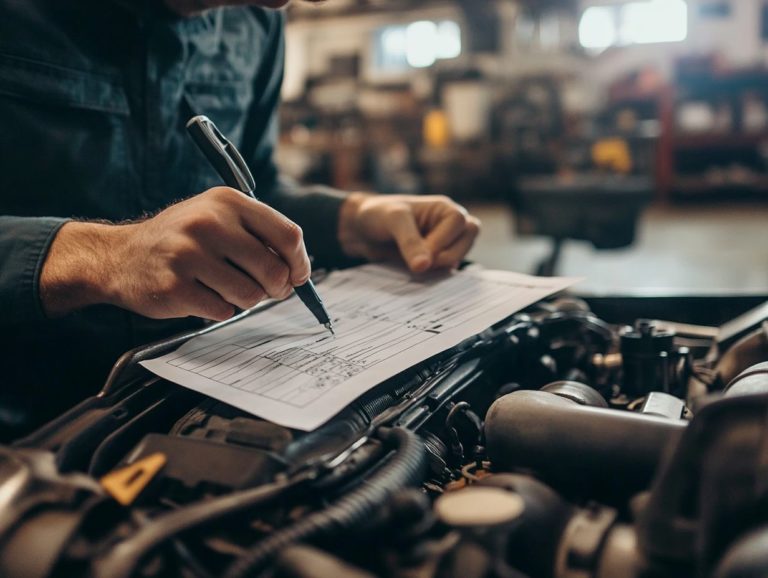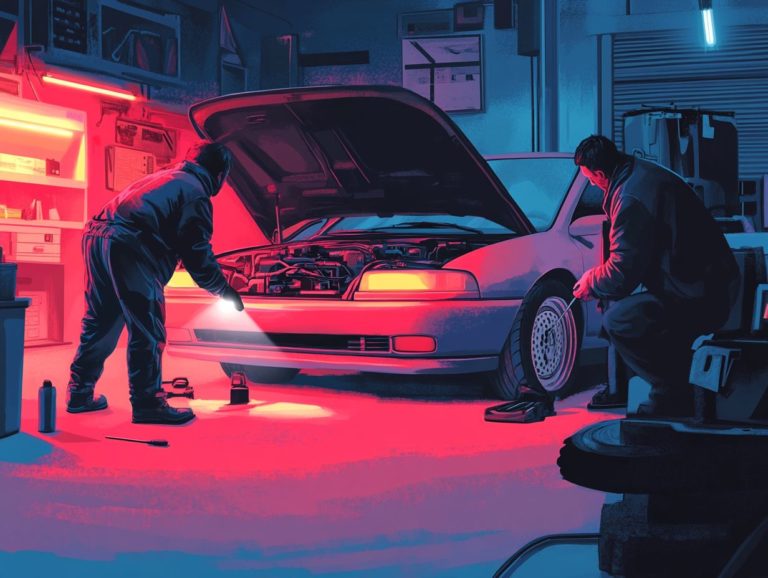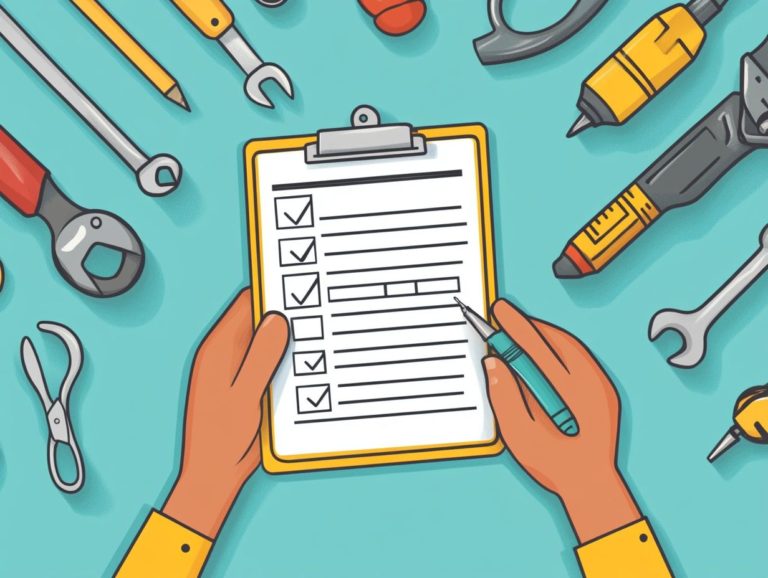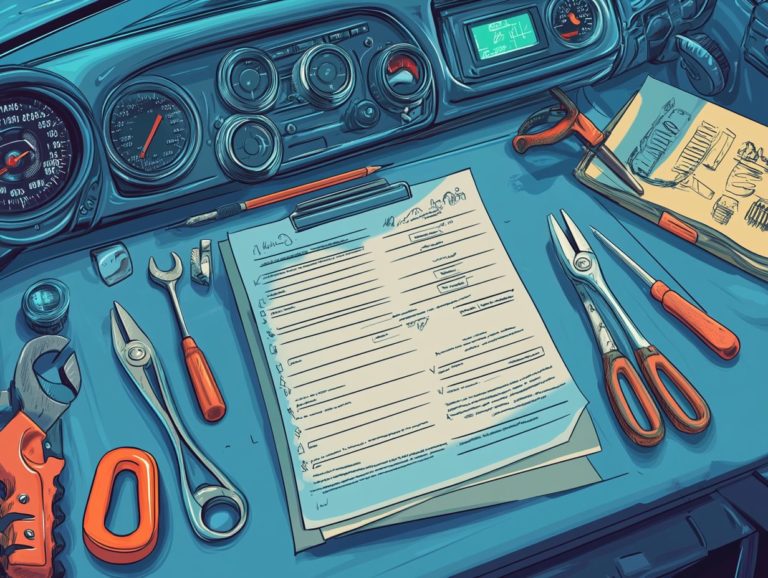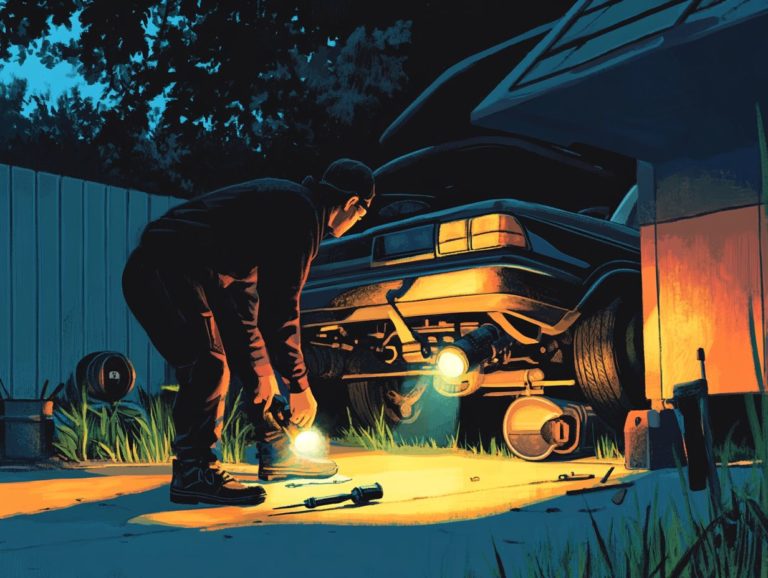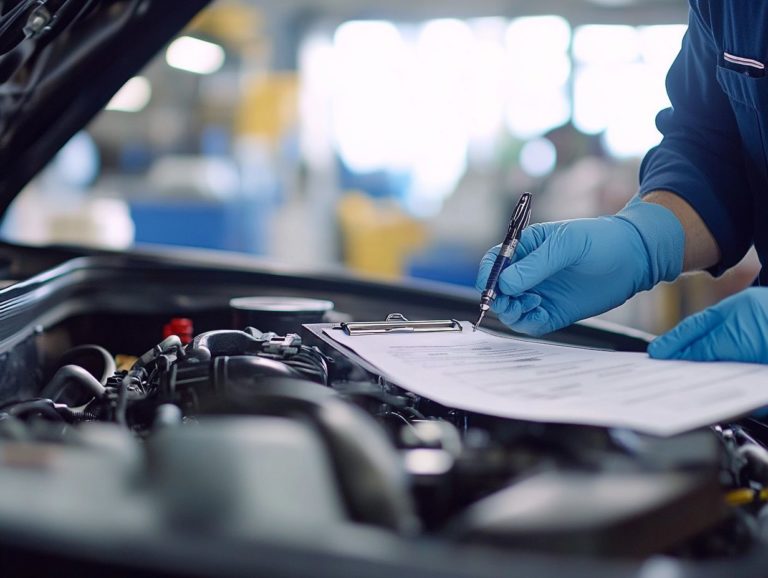What Does a Comprehensive Car Inspection Include?
Regular car inspections are vital for maintaining your vehicle’s safety and longevity. They allow you to pinpoint potential issues before they spiral out of control, ultimately enhancing your driving experience.
This article delves into the significance of getting your car inspected, outlining what a thorough inspection covers everything from exterior and interior checks to under-the-hood diagnostics. You’ll also find insights into common problems that are often uncovered during these assessments.
It also explains how often you should schedule inspections and offers tips for selecting the right service. Equip yourself with the knowledge needed to keep your vehicle running smoothly and safely!
Contents
Key Takeaways:
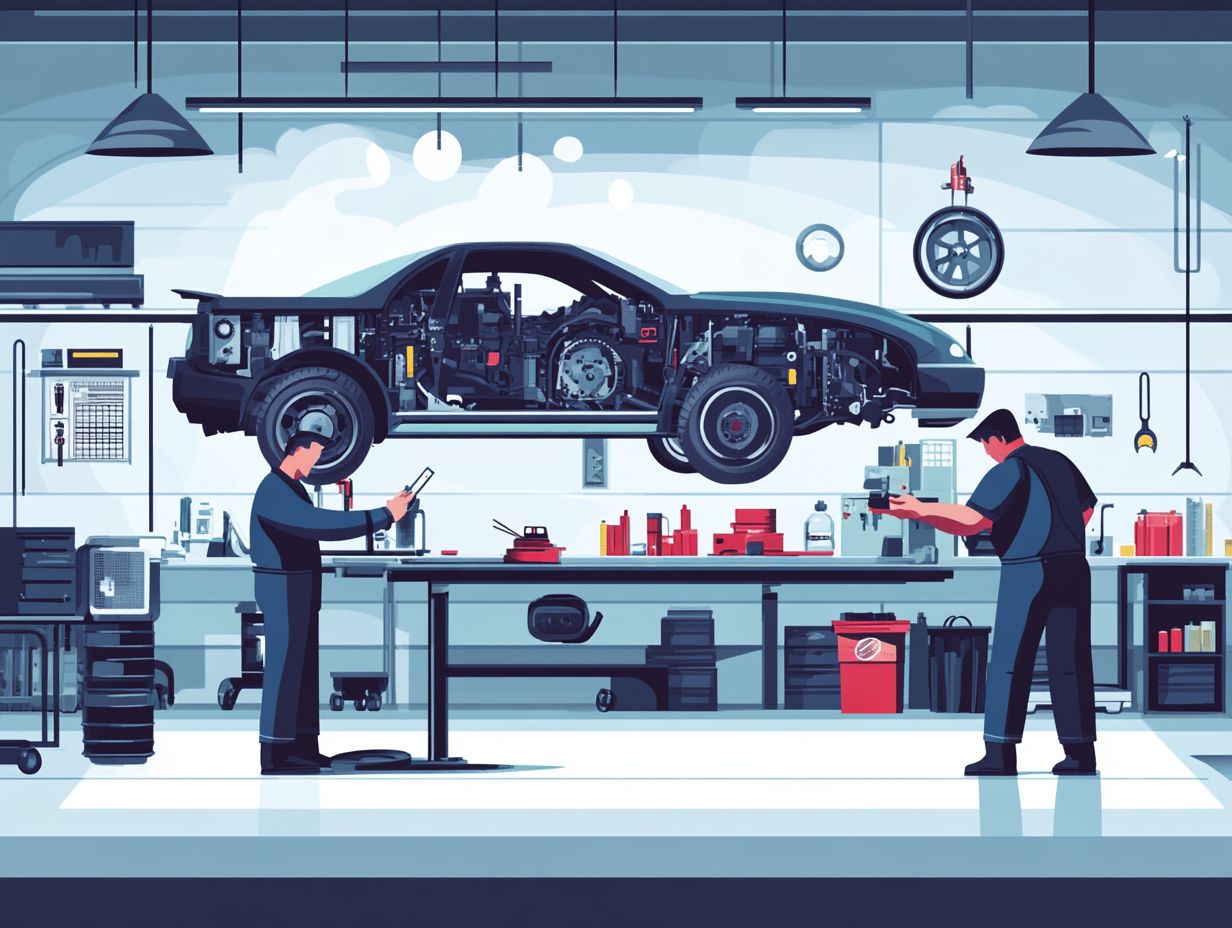
A comprehensive car inspection includes thorough checks of both the exterior and interior, as well as under the hood, to ensure all components are functioning properly.
Regular car inspections are important for identifying and addressing potential issues before they become major problems, saving you time and money in the long run.
The recommended frequency for car inspections is every 6 months or every 6,000 miles, but this may vary depending on the vehicle’s age and usage.
The Importance of Regular Car Inspections
Regular car inspections are essential for ensuring the safety and performance of your vehicle. They help you identify potential issues, like internal and external damages, and are critical for maintaining mechanical reliability.
By committing to routine safety inspections, you can avoid accidents and extend your vehicle’s lifespan.
A thorough inspection covers various components, including the brake system, tire pressure, and fluid levels. This gives you peace of mind and ensures you meet safety rules set by organizations like the National Highway Traffic Safety Administration (NHTSA, the government agency that oversees road safety in the U.S.).
Why You Should Get Your Car Inspected
Getting your car inspected regularly is key to keeping it in peak condition, ensuring your safety and reliability on the road. These inspections are essential for uncovering hidden damages that might not be immediately apparent.
They help you dodge potential issues that could affect performance or safety. Regular assessments also ensure you remain compliant with safety standards, ultimately reducing the risk of accidents and creating a more secure driving environment.
Having a comprehensive inspection report is invaluable for insurance purposes. It provides crucial identification details that streamline the claims process in the event of an incident.
These reports aid in assessing any damage, allowing you to stay ahead of maintenance needs, extend your vehicle’s lifespan, and enhance its overall value.
What a Comprehensive Car Inspection Includes
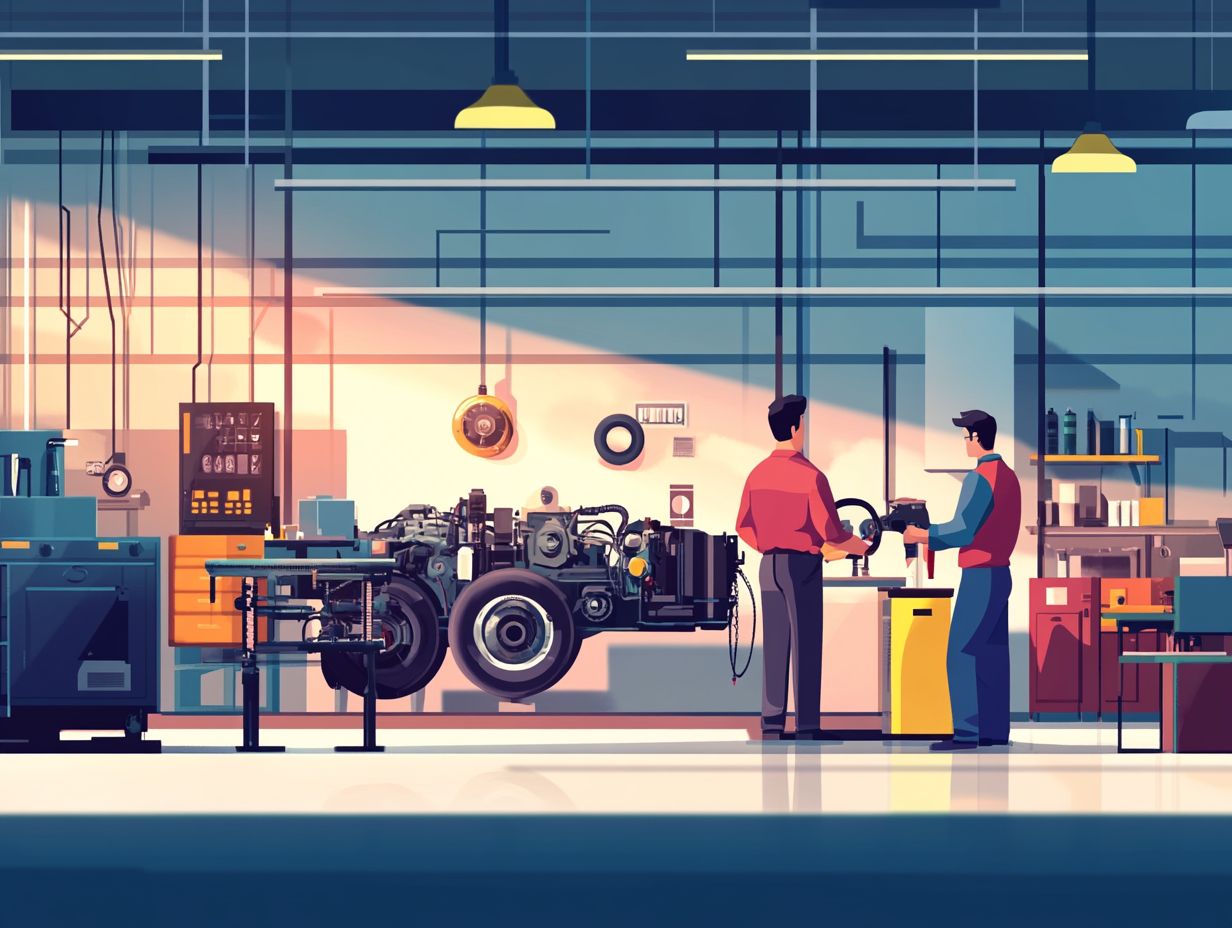
A comprehensive car inspection involves a careful check of both the exterior and interior of your vehicle. It ensures that all critical components are operating as they should.
This process includes identifying hidden damages, evaluating mechanical performance, and assessing wear and tear, all while conducting a visual inspection of the vehicle’s body and interior features.
Different types of inspections, such as safety checks and pre-purchase evaluations, equip you with a detailed understanding of your car’s condition. An inspection checklist acts as a systematic guide for automotive technicians, ensuring nothing is overlooked during the evaluation process.
Exterior and Interior Checks
The exterior and interior checks of a vehicle inspection are crucial for pinpointing any external or internal damages that could jeopardize safety and performance.
During the exterior inspection, automotive technicians carefully scrutinize key components like the body, windshield, and lights for cracks, dents, or signs of wear that could impair functionality or pose hazards. They ll also evaluate tire condition by inspecting for uneven wear patterns, proper tread depth, and inflation levels.
The interior inspection dives into critical systems such as the brakes and seat belts. Here, technicians will assess worn brake pads that could compromise stopping power and frayed seat belts that may threaten passenger safety.
This thorough evaluation highlights the necessity of addressing potential issues before they escalate into more serious problems, ensuring you enjoy a safer driving experience while extending the lifespan of your vehicle.
Are you aware of how a small issue can become a major headache? Schedule your car inspection today to keep your vehicle in top shape!
Under the Hood Inspection
An under-the-hood inspection shines a spotlight on critical mechanical components. It scrutinizes engine performance and fluid levels to guarantee optimal functionality. During this comprehensive examination, several key areas demand your attention.
- Battery health is one focus. Technicians assess its charge capacity and overall condition, ensuring that your vehicle starts reliably every time.
- Fluid levels think oil, coolant, and brake fluid are meticulously monitored to avert potential overheating and maintain seamless operation.
- Steering components are evaluated for wear and tear. Their stability is crucial for safe handling.
Regular mechanical inspections help you catch problems early, keeping your vehicle safe and running smoothly!
Testing and Diagnostics
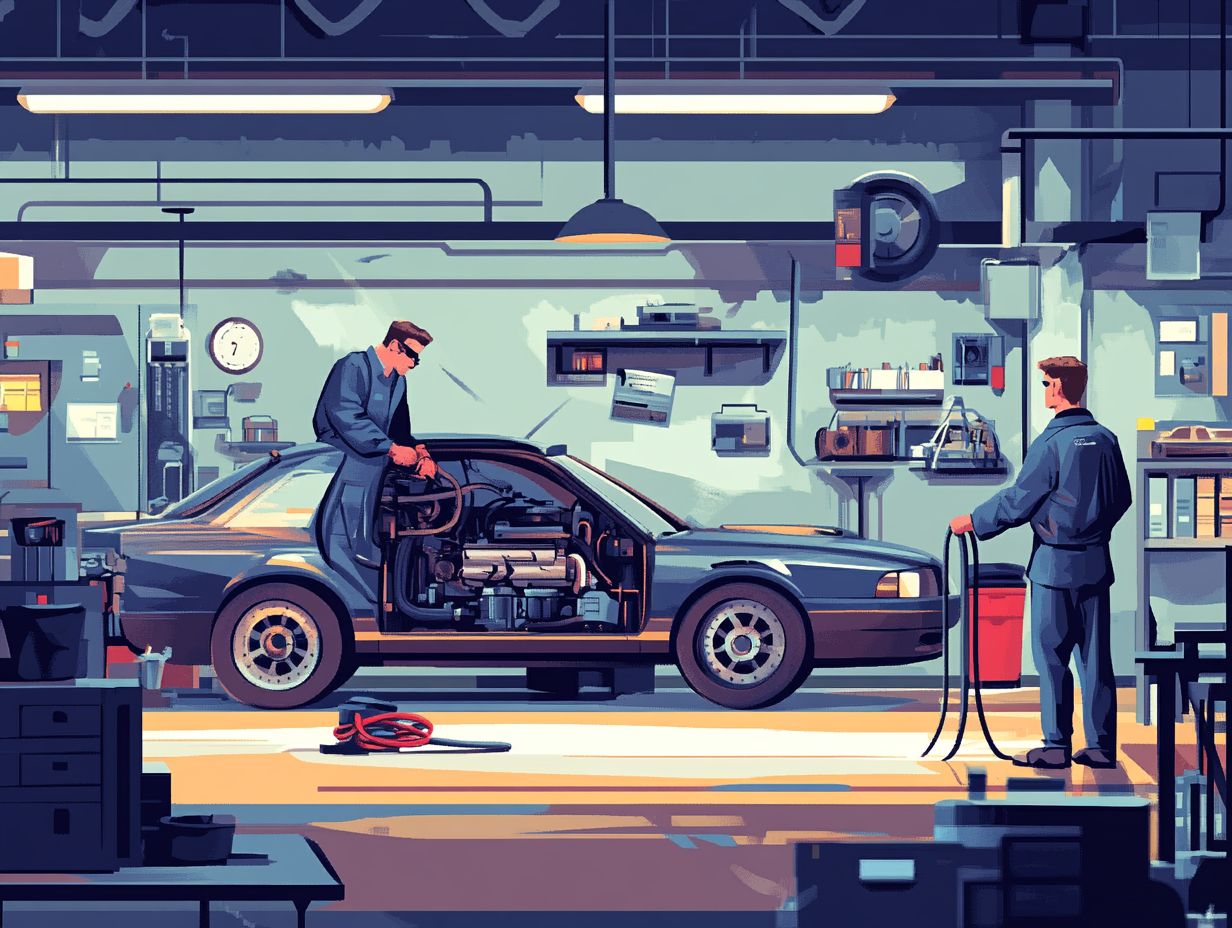
Testing and diagnostics are essential components of a thorough car inspection. Automotive technicians use advanced tools to evaluate critical systems, including the brake system and emissions.
These diagnostic tests are important for checking your vehicle’s overall health. They uncover any irregularities that might not be immediately visible.
For example, emissions testing confirms that your car adheres to environmental regulations, effectively minimizing its carbon footprint. By using specialized equipment to analyze exhaust gases, technicians can pinpoint issues such as malfunctioning catalytic converters or problematic fuel mixtures that could harm the environment.
Detecting these issues early helps you address them promptly. This can avert costly repairs in the future and ensure your vehicle performs at its best on the road.
Common Issues Found During Car Inspections
Car inspections frequently reveal a range of common issues, from subtle wear and tear to significant collision damage that might not catch your eye at first glance.
Top Problems and Their Solutions
Identifying key issues during car inspections is essential for timely repairs and ensuring your vehicle’s safety. Skilled automotive technicians offer tailored solutions to tackle these problems effectively.
Common challenges encountered during inspections include:
- Brake wear
- Fluid leaks
- Tire health
If a technician spots worn brake pads, they ll likely recommend an immediate replacement to prevent further damage to the rotors. This ensures safe stopping performance. Detecting a fluid leak be it oil or coolant could prompt proactive measures to avoid potential engine damage down the line. Tire tread wear is another critical factor; a technician might suggest a rotation or replacement to boost handling and prevent blowouts.
Automotive services are vital in diagnosing these issues and providing sound repair recommendations. This ensures your vehicle maintains its performance and safety over time.
How Often Should You Get Your Car Inspected?
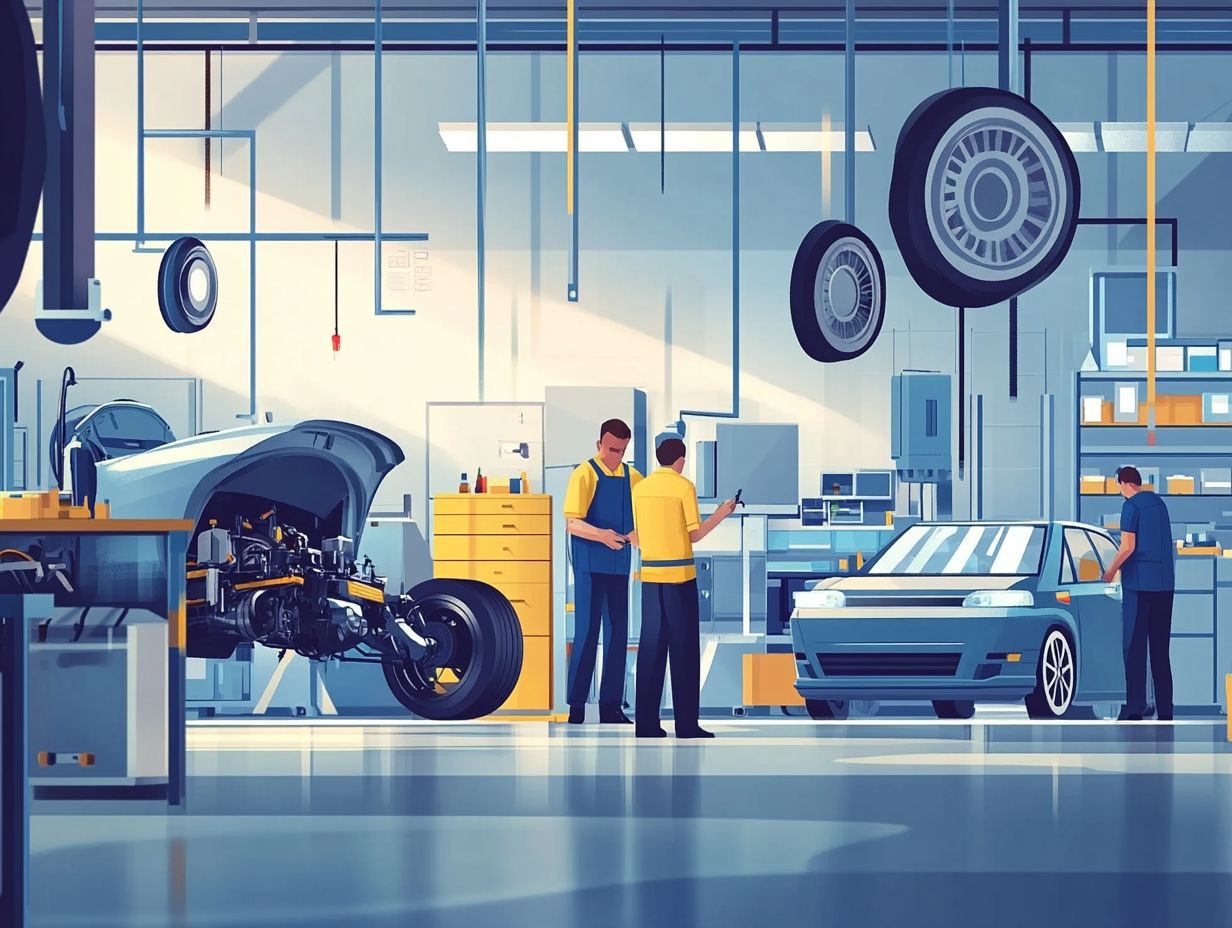
The frequency of your car inspections can vary based on several factors, such as the age of your vehicle, how you use it, and the regulations in your area.
However, follow the rule of thumb: get your car inspected at least once a year to maintain optimal performance.
Recommended Frequency for Inspections
Most experts recommend that you should have your vehicle inspected at least once a year. If you drive an older model or frequently face challenging conditions, more frequent checks are wise.
Vehicles over a decade old or those regularly tasked with heavy loads could greatly benefit from semi-annual inspections to maintain optimal performance and safety.
If you navigate rough terrains or endure extreme weather, considering quarterly inspections could help you identify potential issues before they escalate.
Staying updated with your vehicle maintenance routine is essential for preserving its reliability. By closely monitoring wear and tear especially in critical systems like brakes and the engine you can significantly minimize the risk of breakdowns. This ensures peace of mind for everyone on the road.
Choosing the Right Car Inspection Service
Choosing the right car inspection service is crucial for guaranteeing that your vehicle undergoes a comprehensive and precise evaluation by skilled automotive technicians.
Factors to Consider
When you choose an inspection service, consider several key factors. Look at the technicians’ qualifications and the thoroughness of the inspection checklist.
Customer feedback is also essential. These factors ensure the service meets high standards of quality and reliability.
Certifications reflect a technician’s expertise and dedication to staying updated with industry practices. The experience level of the team can significantly affect the inspection’s thoroughness.
Experienced professionals are often better at spotting potential issues that others might miss. Pay attention to customer reviews for insights into the service’s real-world effectiveness and past client satisfaction.
By considering these factors, you can make informed decisions for a safer and more satisfying experience.
Frequently Asked Questions
What Does a Comprehensive Car Inspection Include? A comprehensive car inspection includes a thorough examination of all vehicle aspects, from the engine to the exterior. It’s important to know what to look for in a car inspection to ensure the car is safe and in good working condition.
Is a Comprehensive Car Inspection Necessary?
Yes! A comprehensive car inspection is essential for safety. It helps identify potential problems before they become costly repairs.
How Long Does a Comprehensive Car Inspection Take?
The duration varies depending on the vehicle type and condition. On average, it takes 2 to 4 hours.
What Are the Key Components Checked in a Comprehensive Car Inspection?
Key components include the engine, battery, brakes, tires, suspension, steering, lights, fluids, and overall body condition.
Can I Get a Comprehensive Car Inspection Done Before Purchasing a Used Vehicle?
Absolutely! It’s highly recommended to have this done. It helps identify issues and gives you a clearer picture of the vehicle’s condition.
How Often Should a Comprehensive Car Inspection Be Done?
Get a comprehensive car inspection at least once a year or every 12,000 miles, whichever comes first. If you notice any issues, get it inspected immediately.

